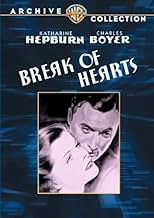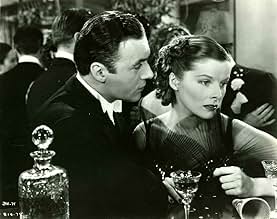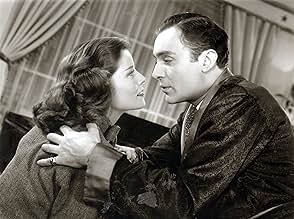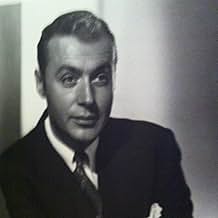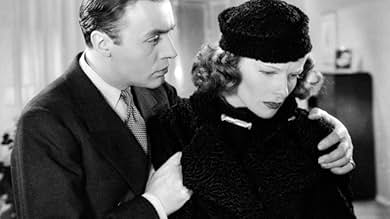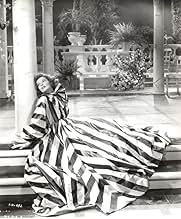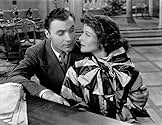Adicionar um enredo no seu idiomaFranz Roberti, orchestra conductor with multiple girlfriends, meets aspiring composer Constance through Professor Thalma. They marry, honeymoon across Europe, but Constance leaves after find... Ler tudoFranz Roberti, orchestra conductor with multiple girlfriends, meets aspiring composer Constance through Professor Thalma. They marry, honeymoon across Europe, but Constance leaves after finding Franz with a divorcee.Franz Roberti, orchestra conductor with multiple girlfriends, meets aspiring composer Constance through Professor Thalma. They marry, honeymoon across Europe, but Constance leaves after finding Franz with a divorcee.
- Direção
- Roteiristas
- Artistas
- Prêmios
- 4 vitórias no total
- Albert Henderson
- (não creditado)
- Messenger
- (não creditado)
- Man in Hotel
- (não creditado)
- Max
- (não creditado)
- Radio Announcer
- (não creditado)
- Mr. Lubin
- (não creditado)
Avaliações em destaque
Lederer (born Frantisek or Franz Lederer in Prague) was a handsome leading man-type actor who developed into a matinee idol in European films just before his arrival in the US in 1932. Although darkly attractive and warmly regarded by the critics, American audiences seemed not to be positively responding to him. RKO's strategy in 1935 was to cast Hepburn and Lederer together in a film with the hope that this combination would prove to generate a hit for both of them. The project was to be named Break of Hearts (BOH) and would be directed by Philip Moeller of the Theatre Guild. Then RKO started to film the picture. Trouble began shortly thereafter.
It turned out that Lederer was a temperamental and insecure actor, who initiated a quarrel with Moeller because he felt that the director was tilting BOH more in favor of Hepburn's character. During the second week of filming, Lederer walked off the set, and did not return. A desperate RKO sought out Charles Boyer to fill the void based upon his recent success in the film Private Worlds----and fill it he did. Hepburn and Boyer became a congenial acting couple and BOH was smoothly finished without further complications.
However, BOH did not meet box office expectations. Critics felt that Moeller was a static film director, and Hepburn's role of a long suffering serious composer providing endless support for a hedonistic symphony conductor left much to be desired as entertainment. BOH reinforced Boyer's growing reputation in Hollywood as an appealing Continental lover-type character who also had depth and conviction as an actor. Unfortunately, BOH's tepid box office results continued to complicate Hepburn's marketability and reinforced the impression that she seemed to have problems selling herself as a commercially viable artist.
BOH contained fine acting performances from its two principals and had an intelligent (if somewhat overwrought) script. However, the Boyer character was hard to like, and Hepburn's commitment to him grew tiresome to the film's audiences. In the end, their fans were underwhelmed. Hepburn made a modest comeback in her next film (Alice Adams (1935)), but continued on a mercurial career trajectory that was a feature of her work in the 1930s. She could not then realize that her best years were still ahead of her.
Boyer is a Tiger Woods-Jesse James type - he's a conductor who marries a young fledgling composer, is caught cheating on her, and she leaves him. Then he hits the skids.
Predictable '30s drama. Both Boyer and Hepburn are ridiculously young and very attractive. Boyer is quite charming and moody as the conductor. Considering their respective careers, this is really just a blip on the radar.
World famous conductor and womanizer Franz Roberti drops by an old friend's and meets Constance Dane a music teacher and aspirant composer. He's pleasant to her but no more. When she can't get a ticket to his sold out show she sneaks into a rehearsal and creates a scene that first annoys and then charms Roberti. They go out and Roberti lays out his Casanova MO to her but much to his surprise finds himself falling in love and marrying her. They globe trot on their honeymoon and all is well until she discovers he has returned to his old ways and decides to leave him. Crestfallen they almost reconcile but she rejects him and he takes to drink sabotaging his career.
The early scenes between the pair falling in love has a charming energy as Boyer's dark eyed intensity and magnificent inflection charm Hepburn's bedazzled beauty. But once the honeymoon ends and Constance books the film descends into a mawkish affair it can't climb out of with both leads becoming a touch too strident.
Philip Moeller's direction is flat and uninspired as he relies heavily on Hepburn close-ups and Boyer's roving eye to make his point. Advancing the story choppily and with little form in the process the glossy sets and lavish costumes lack the sweep they deserve with Moeller's camera movements tentative at best.
The most ironic moment in the film is when Hepburn launches into discourse on how she will look out for the sodden Roberti eerily reflecting her relationship with Spence a decade away.
Overall, while the acting is pretty good and a nice looking production, the movie itself is very ordinary...at best. In fact, some parts are a bit embarrassing to watch--it just wasn't written all that well and seemed overdone and unreal--particularly in the second half. A sticky and clichéd soap opera and not a whole lot more. There just wasn't enough interesting material in this film to elevate it anything more than a time-passer. Too bad--with this talent, it should have been a lot better.
Você sabia?
- CuriosidadesAmong the many women whose photos adorn Franz Roberti's apartment is a very blonde Lucille Ball, who was an RKO Radio contract player at the time this film was made.
- Citações
Franz Roberti: I feel better.
Constance Dane Roberti: Did you feel badly?
Franz Roberti: You don't have to feel bad to feel better.
- ConexõesReferences Moulin Rouge (1934)
- Trilhas sonorasSymphony No. 9 in E minor 'From the New World'
(1893) (uncredited)
Written by Antonín Dvorák
Excerpts played at a concert
Principais escolhas
Detalhes
- Data de lançamento
- País de origem
- Idiomas
- Também conhecido como
- Corazones rotos
- Locações de filme
- Empresa de produção
- Consulte mais créditos da empresa na IMDbPro
Bilheteria
- Orçamento
- US$ 427.000 (estimativa)
- Tempo de duração1 hora 18 minutos
- Cor
- Proporção
- 1.37 : 1
Contribua para esta página


